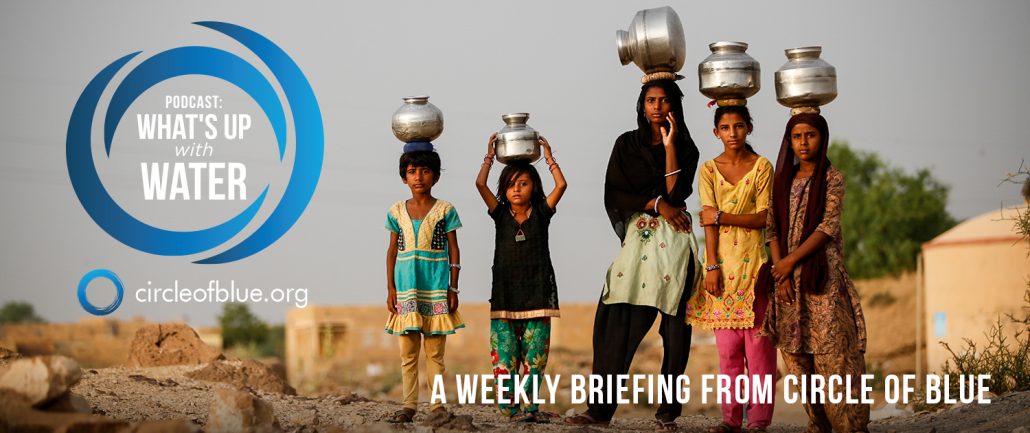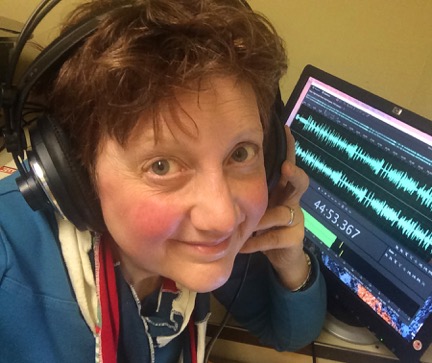
Transcripts
What’s Up With Water for March 5, 2018
I’m Eileen Wray-McCann, for Circle of Blue, and here’s What’s up with Water, a condensation of the world’s water news.
Residents of Cape Town continue to forestall Day Zero with an extreme conservation strategy. Day Zero, the projected date water runs out for most homes and businesses in the city, is holding at July 9th.
Meanwhile, farmers in South Africa’s Western Cape province have had to trim water use by 60%, and as a result, agricultural production is expected to be down 20% this year. Wheat production has been the hardest hit – it may be half of last year’s harvest, forcing wheat imports to double. The drought will reduce exports of apples, pears and grapes, and the lack of rain will continue to put stress on the Western Cape’s renowned wine industry. Officials in South Africa are hoping to make their water last until the rainy season, while fine-tuning conservation to better manage water for the future.
More on Day Zero as coverage continues at circleofblue.org.
—————————
In the Middle East, cholera could worsen significantly in Yemen as the country enters its rainy season. The World Health Organization warns of a spike in cholera in the next couple of months. Since an outbreak in 2016, over a million cholera cases have been reported, with over 2,000 deaths.
Cholera is a disease spread through shared water and food. It’s associated with poor sanitation and infrastructure. Three years of conflict in Yemen have eroded the country’s healthcare and water systems. Health officials expect the cholera epidemic to surge with the rains in April, and possibly in August as well.
——————————
In the United States, a legislative bill proposed in Michigan seeks to ease the way for large-scale groundwater withdrawals, in a manner that could make the process less transparent to the public.
The State House bill aims to assist farms or businesses that propose to take large quantities of Michigan groundwater. It would allow them to bypass the modeling tool currently used to evaluate their plans. Instead of using the Department of Environmental Quality’s evaluation tool, which is presently required, the applicant would be able to use their own evaluation from their own expert. If the DEQ contests the well, the withdrawal can still proceed, but within two years the well is tested to see if there has been harm to stream flows or fish. The author of the bill wants the burden of proof to be on the DEQ to show damage to the water resource. If the applicant is a farmer, their data and analysis, including the amount of water to be taken, would be exempt from the public disclosure requirements of the Michigan Freedom of Information Act.
Opponents say the bill would cripple the process of oversight, inviting harm to Michigan’s waters that would be hidden from the public.
In other U.S. water news, a story of water conservation success on the Great Plains. A recent Kansas State University study found that a plan by farmers in northwest Kansas to reduce pumping from a major aquifer cut groundwater withdrawals while also maintaining profitable farms. More on that this week from Circle of Blue’s Brett Walton at circleofblue.org.
————————————
In Nigeria, during an international conference on the Lake Chad region, the United Nations Educational Scientific and Cultural Organization said that employment is vital. The organization will help people find jobs related to Lake Chad, to protect the lake and strengthen the communities around it. Lake Chad has shrunk considerably in the last 50 years, due to dry conditions and growing populations. Water stress has contributed to rising poverty, and increased conflict, with more people vulnerable to recruitment by militant groups. The challenges are magnified because Lake Chad is bordered by multiple nations.
UNESCO’s plan includes algae harvesting and protecting endangered cattle, as well as water conservation and cultural preservation. UNESCO holds that if Lake Chad is a source of income, it will be managed more sustainably. The plan was developed in cooperation with the communities around the lake.
———————————
And that’s What’s Up With Water…We’d like to share what’s up where you are – Tweet us with your water news: @circleofblue #whatsupwithwater.
Eileen Wray-McCann is a writer, director and narrator who co-founded Circle of Blue. During her 13 years at Interlochen Public Radio, a National Public Radio affiliate in Northern Michigan, Eileen produced and hosted regional and national programming. She’s won Telly Awards for her scriptwriting and documentary work, and her work with Circle of Blue follows many years of independent multimedia journalistic projects and a life-long love of the Great Lakes. She holds a BA and MA radio and television from the University of Detroit. Eileen is currently moonlighting as an audio archivist and enjoys traveling through time via sound.



